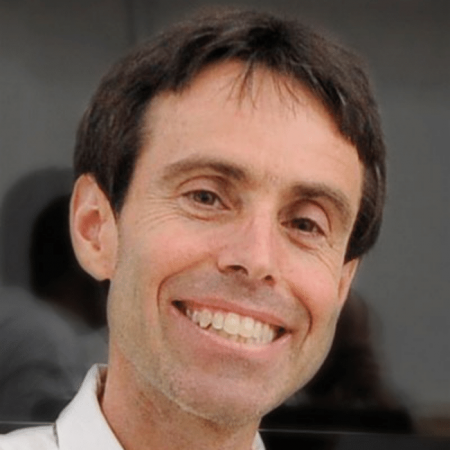 Howie Choset is a Professor of Robotics where he serves as the co-director, along with Matt Travers, of the Biorobotics Lab. Choset’s research program has made contributions to strategically significant problems in surgery, manufacturing, on-orbit maintenance, recycling and search and rescue. His work is most famous for its snake robots and other biologically inspired systems and recently his group has been contributing to robotic modularity, multi-agent planning, information-based search, and skill learning. Currently, Choset’s projects include: medical support in the field, expeditionary robotics, on-orbit maintenance and construction of structures in space, rapidly carrying heavy objects up several flights of stairs, recycling of E-waste, food preparation, “edge”-sensing, and aerospace painting.
Howie Choset is a Professor of Robotics where he serves as the co-director, along with Matt Travers, of the Biorobotics Lab. Choset’s research program has made contributions to strategically significant problems in surgery, manufacturing, on-orbit maintenance, recycling and search and rescue. His work is most famous for its snake robots and other biologically inspired systems and recently his group has been contributing to robotic modularity, multi-agent planning, information-based search, and skill learning. Currently, Choset’s projects include: medical support in the field, expeditionary robotics, on-orbit maintenance and construction of structures in space, rapidly carrying heavy objects up several flights of stairs, recycling of E-waste, food preparation, “edge”-sensing, and aerospace painting.
Choset has led multi-PI projects centered on manufacturing: (1) automating the programming of robots for auto-body painting; (2) the development of mobile manipulators for agile and flexible fixture-free manufacturing of large structures in aerospace, and (3) the creation of a data-robot ecosystem for rapid manufacturing in the commercial electronics industry. Along with George Darakos and Gary Fedder, Choset co-lead the formation of the Advanced Robotics for Manufacturing Institute, which is $250MM national institute advancing both technology development and education for robotics in manufacturing.
Choset’s work has been recognized by several best paper awards and nominations, four in the past year – Best Paper, Best Systems Paper, and nomination for Best paper at Robotics Systems and Science in 2021, Best Paper at Distributed and Autonomous Robot Systems in 2021. In 2020, his group’s ventilator work received second place in the Three Rivers Technology Showcase. In 2019, Choset was honored with the Engleberger Award, the highest award in Robotics, for contributions to research and education. A long time ago, Choset was selected by the MIT Technology Review for being the top 100 innovators under 35 in the world. Finally, Choset’s work has appeared in Science and the Proceedings of the National Academies (PNAS).
Choset and his students formed several companies including Medrobotics, for surgical systems, Hebi Robotics, for modular robots, Bito Robotics for autonomous guided vehicles, Omnibus Medical Devices, and Latent Robotics for Recycling. Choset has also mentored students in forming their own companies and plays an active role in the Pittsburgh Robotics Network. Choset is also a founding Editor of and still serves as an editor for the journal, Science Robotics – the highest impact robotics journal.
Choset plays a critical role in shaping national policy for robotics and in building public awareness of the importance of robotics to the nation’s future. His helped lead the development of the National Robotics Initiative, a White House initiative launched by President Obama and shaped congressional initiatives through the House Robotics Caucus. This leadership in shaping the national agenda also includes serving on the AdComm committee for the IEEE Robotics Society. Currently, Choset also represents the United States in the Global Partnership for Artificial Intelligence. Choset’s efforts to excite the public about robotics include media engagements such as appearing the Late Show with Jimmy Fallon
Choset has been a strong proponent for undergraduate education. He seamlessly includes them in his group efforts, which often culminates in best paper awards and careers in prestigious institutions, including two professors at Carnegie Mellon. In 1998, Choset formed and led the Robotics Minor, the first undergraduate certification for Robotics in the US, and in 2007, the Robotics Major. Choset, along with George Kantor and other colleagues, co-authored a textbook on Motion Planning. Currently, Choset and his former student Ross Hatton are writing a book on Geometric Mechanics.
Choset is in love with the Robotics community at Carnegie Mellon, often handing out a seemingly endless supply of “I heart Robot” Buttons. As such, his educational philosophy is to empower people. This includes both technical and non-technical subjects. He speaks to his class, once a semester, either on gender discrimination or suicide. He also insists on accompanying students to the hospital, when they are in need of emergency services. In 2020, along with Katia Sycara, he co-formed the RI Climate Committee whose original charge was to assist people who found themselves being the victim of unfair power dynamics. This committee expanded its scope to also address, as a community, the social unrest and discrimination that faced the US, and hosted Town Hall Meetings to discuss these topics.